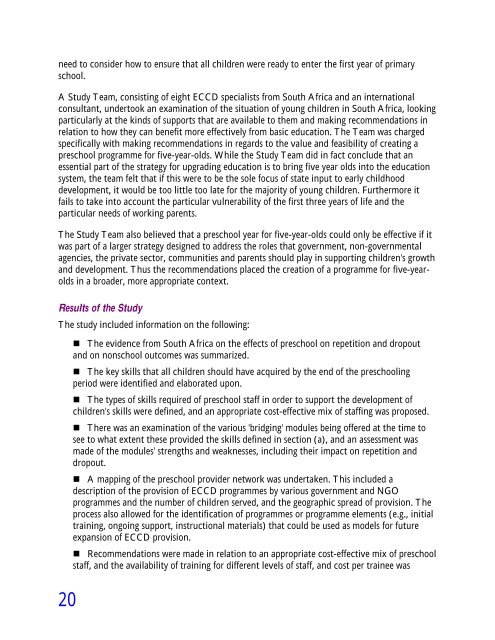How Policy Affects Early Childhood Care and Development.
How Policy Affects Early Childhood Care and Development.
How Policy Affects Early Childhood Care and Development.
Create successful ePaper yourself
Turn your PDF publications into a flip-book with our unique Google optimized e-Paper software.
need to consider how to ensure that all children were ready to enter the first year of primary<br />
school.<br />
A Study Team, consisting of eight ECCD specialists from South Africa <strong>and</strong> an international<br />
consultant, undertook an examination of the situation of young children in South Africa, looking<br />
particularly at the kinds of supports that are available to them <strong>and</strong> making recommendations in<br />
relation to how they can benefit more effectively from basic education. The Team was charged<br />
specifically with making recommendations in regards to the value <strong>and</strong> feasibility of creating a<br />
preschool programme for five-year-olds. While the Study Team did in fact conclude that an<br />
essential part of the strategy for upgrading education is to bring five year olds into the education<br />
system, the team felt that if this were to be the sole focus of state input to early childhood<br />
development, it would be too little too late for the majority of young children. Furthermore it<br />
fails to take into account the particular vulnerability of the first three years of life <strong>and</strong> the<br />
particular needs of working parents.<br />
The Study Team also believed that a preschool year for five-year-olds could only be effective if it<br />
was part of a larger strategy designed to address the roles that government, non-governmental<br />
agencies, the private sector, communities <strong>and</strong> parents should play in supporting children's growth<br />
<strong>and</strong> development. Thus the recommendations placed the creation of a programme for five-yearolds<br />
in a broader, more appropriate context.<br />
Results of the Study<br />
The study included information on the following:<br />
20<br />
! The evidence from South Africa on the effects of preschool on repetition <strong>and</strong> dropout<br />
<strong>and</strong> on nonschool outcomes was summarized.<br />
! The key skills that all children should have acquired by the end of the preschooling<br />
period were identified <strong>and</strong> elaborated upon.<br />
! The types of skills required of preschool staff in order to support the development of<br />
children's skills were defined, <strong>and</strong> an appropriate cost-effective mix of staffing was proposed.<br />
! There was an examination of the various 'bridging' modules being offered at the time to<br />
see to what extent these provided the skills defined in section (a), <strong>and</strong> an assessment was<br />
made of the modules' strengths <strong>and</strong> weaknesses, including their impact on repetition <strong>and</strong><br />
dropout.<br />
! A mapping of the preschool provider network was undertaken. This included a<br />
description of the provision of ECCD programmes by various government <strong>and</strong> NGO<br />
programmes <strong>and</strong> the number of children served, <strong>and</strong> the geographic spread of provision. The<br />
process also allowed for the identification of programmes or programme elements (e.g., initial<br />
training, ongoing support, instructional materials) that could be used as models for future<br />
expansion of ECCD provision.<br />
! Recommendations were made in relation to an appropriate cost-effective mix of preschool<br />
staff, <strong>and</strong> the availability of training for different levels of staff, <strong>and</strong> cost per trainee was
















